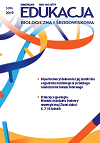Hiperhomocysteinemia i jej skutki dla organizmu ludzkiego w przebiegu niedoborów kwasu foliowego
Hyperhomocysteinemia and its effects on the human body in the course of folic acid deficiency
Author(s): Krystyna GillnerSubject(s): Health and medicine and law
Published by: Instytut Badań Edukacyjnych
Keywords: folic acid; homocysteine; neural tube defects; stroke;
Summary/Abstract: The health of a human, from the moment of conception to one’s natural death, depends on the influence of many factors, both exo- and endogenous. In addition to the individual genetic determinants and lifestyle of a given individual, one of the most important elements affecting the health of the body is the electrolyte and vitamin balance, including the appropriate level of folic acid. Folic acid is a vitamin that regulates many important biochemical processes at the cellular level. Its deficiency results in an increase in the level of homocysteine in the blood, which has a toxic effect on the condition of the body’s vessels. Low levels of folic acid in the blood serum of women at the time of conception often result in serious disturbances of embryonic development and organogenesis leading to fetal defects. In a mature age, folic acid continues to perform important functions in the body. It regulates biochemical transformations, preventing, among others, the pathological increase of homocysteine concentrations in the blood. It limits the risk of atherosclerosis, thrombotic, cardiovascular, cerebral, demyelinating, and ischemic strokes and their related complications.
Journal: Edukacja Biologiczna i Środowiskowa
- Issue Year: 2019
- Issue No: 1
- Page Range: 6-12
- Page Count: 7
- Language: Polish

